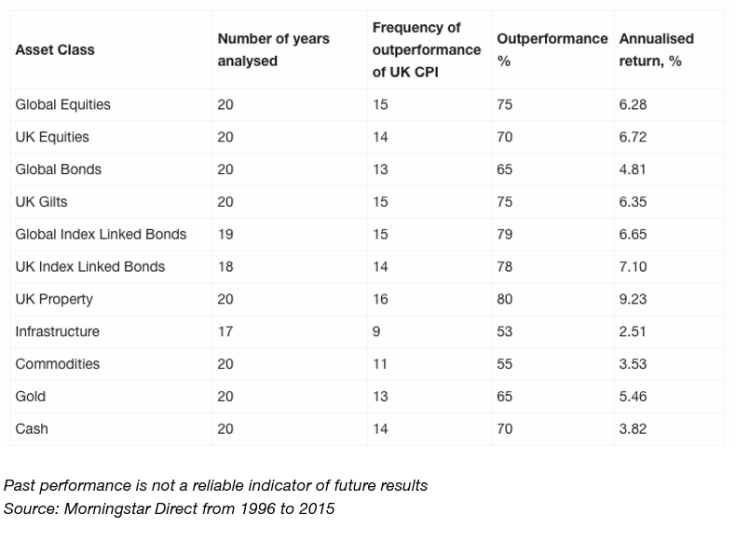Turning the tide: Five investment ideas to defend against rising inflation
A portfolio of diversified assets should help investors beat inflation over time in an era of low interest rates.

Since the financial crisis of 2008-09, central banks across the world have injected huge amounts of quantitative easing into the system in a bid to stimulate growth.
Inflation has remained low for much of that time, but now we are starting to see it creep up, primarily due to the combination of the steep rise in oil prices, the strength of the dollar, as well as the subsequent fall of sterling in the months following the EU referendum result.
The consumer price index (CPI) – the UK's measure of inflation – rose to 1.8% in January 2017, driven by increases in fuel and clothing prices.
While rising inflation can be a positive, it can also threaten the value of your investments if they don't keep pace with it.
And with interest rates at all-time lows, this is particularly the case for cash, although it does make sense for investors to have at least some allocation to cash for rainy day/emergency expenditure.
The chart below shows that not only have real returns on cash been in long-term decline, but these real returns have now turned negative and are expected to continue to do so if inflation starts to pick up.
By contrast, a portfolio of diversified assets should help an investor to beat inflation over time. So what alternative safe havens with potentially inflation-proof attributes could investors turn to?

1. Investing in equities
Companies with high barriers to entry and pricing power can offer some protection against inflation. Those paying dividends provide a further return, whether you choose to take the income or reinvest it. For global equities, take a look at Artemis Global Income. If you want to access just UK companies, Threadneedle UK Equity Income could fit the bill.
As interest rates rise banks are likely to recover their margins and become dividend cash cows. While there isn't a financials fund that TD Direct Investing could recommend, we have seen some managers build up sustainable positions in bank shares: Richard Buxton - Old Mutual UK Alpha and Alastair Mundy Investec UK Special Situations.
2. Investing in index-linked bonds
While inflation is the enemy of bond markets, index-linked bonds, as the name suggests, are linked to inflation in order to protect the value of investments. PIMCO Global Real Return provides global exposure to inflation-protected bonds.
3. Investing in infrastructure and cyclical recovery
Infrastructure assets such as toll roads typically have their prices linked to inflation. First State Global Listed Infrastructure is on our Recommended Funds list.
Funds that will benefit from the growth in spending in infrastructure in the US and UK include Legg Mason IF Royce US Smaller Companies, Artemis UK Select and GLG Undervalued Assets.
4. Investing in oil & commodities
As the crude price rises oil companies will recover from their earnings slump. Guinness Global Energy could be a good fund in which to invest to benefit from this.
Overall, commodities remain an asset class worth considering. Inflation can be closely correlated to the price of oil and other commodities. First State Global Resources invests across a range of commodity holdings.
5. Investing in exchange traded funds (ETFs)
Another way of gaining low-cost access to these asset classes is via exchange traded funds (ETFs). Here are some you may want to investigate further:
- Global index-linked bonds – iShares Global Inflation Linked Government Bond
- Commodities – Lyxor Commodities TR/Core Commodity CRB
- Equity income - SPDR® S&P US Dividend Aristocrats and iShares UK Dividend
What should investors consider to protect their portfolio against inflation?
There are two key things to consider when trying to insure your portfolio against inflation: first, asset classes intended for inflation protection should be genuine inflation hedges. I've given a number of examples within this article.
Second, it is not only important to consider whether a particular asset class is inflation-proof, but also the correlation of asset classes to each other. A diversified portfolio of uncorrelated assets gives a better chance of at least some of those assets providing protection against inflation at different points in the cycle.

The table above shows how each of the asset classes has performed relative to UK inflation over the last 20 years (where data goes back that far).
As ever, it is essential for long-term investors to have a balanced, well-diversified portfolio, whatever the economic backdrop, to hold your nerve and try not to be spooked by short-term fluctuations.
Michelle McGrade is the Chief Investment Officer of TD Direct Investing, the UK brokerage arm of Canada's TD Waterhouse bank. Since the mid-1990s, Michelle has specialised in manager selection and portfolio management, researching managers with different disciplines across the globe. Prior to her role at TD Direct Investing, Michelle worked at both Executive Director and Chief Investment Officer levels at Bank of Bermuda, Coutts, Northern Trust, Investment Solutions and Mediolanum.
© Copyright IBTimes 2025. All rights reserved.






















